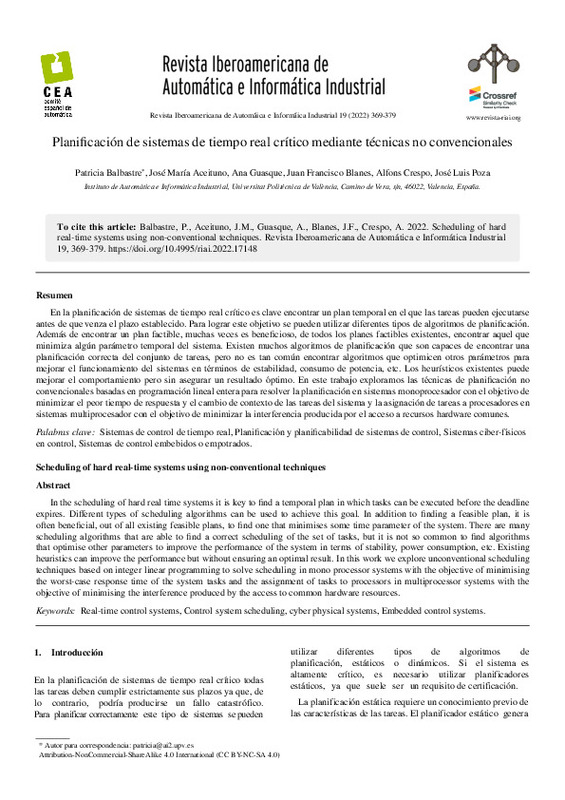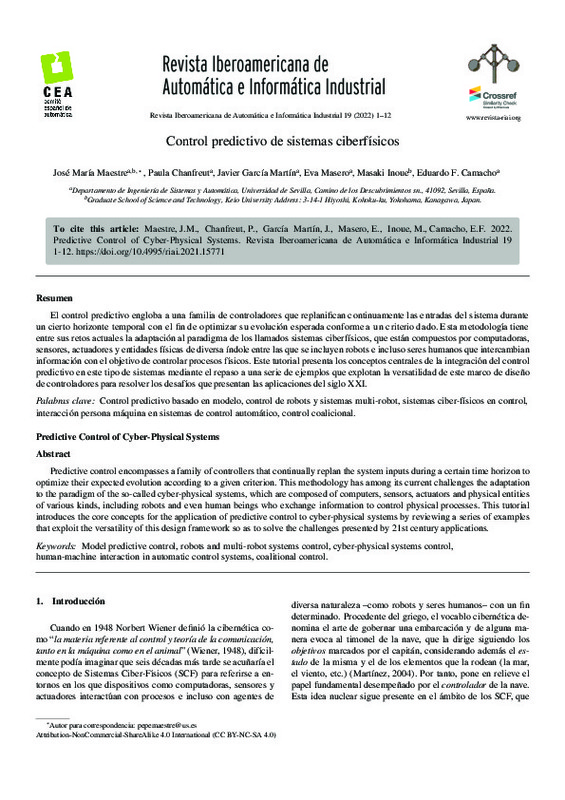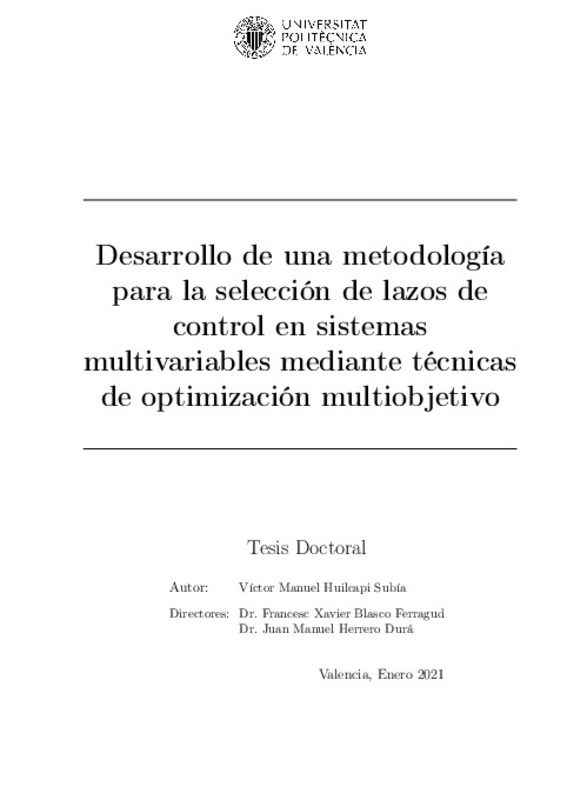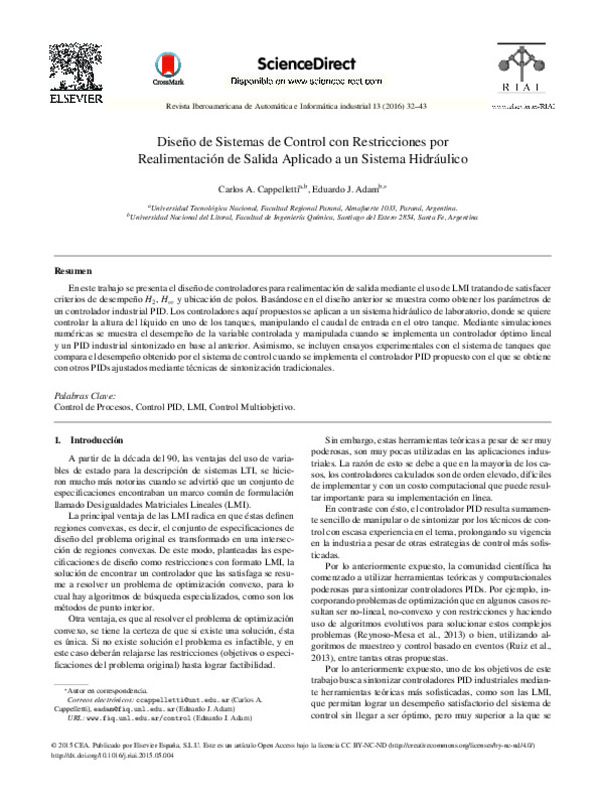JavaScript is disabled for your browser. Some features of this site may not work without it.
Buscar en RiuNet
Listar
Mi cuenta
Estadísticas
Ayuda RiuNet
Admin. UPV
Planificación de sistemas de tiempo real crítico mediante técnicas no convencionales
Mostrar el registro sencillo del ítem
Ficheros en el ítem
| dc.contributor.author | Balbastre, Patricia
|
es_ES |
| dc.contributor.author | Aceituno, José María
|
es_ES |
| dc.contributor.author | Guasque, Ana
|
es_ES |
| dc.contributor.author | Blanes, Juan Francisco
|
es_ES |
| dc.contributor.author | Crespo, Alfons
|
es_ES |
| dc.contributor.author | Poza, José Luis
|
es_ES |
| dc.date.accessioned | 2022-10-05T07:53:01Z | |
| dc.date.available | 2022-10-05T07:53:01Z | |
| dc.date.issued | 2022-09-30 | |
| dc.identifier.issn | 1697-7912 | |
| dc.identifier.uri | http://hdl.handle.net/10251/187022 | |
| dc.description.abstract | [EN] In the scheduling of hard real time systems it is key to find a temporal plan in which tasks can be executed before the deadline expires. Different types of scheduling algorithms can be used to achieve this goal. In addition to finding a feasible plan, it is often beneficial, out of all existing feasible plans, to find one that minimises some time parameter of the system. There are many scheduling algorithms that are able to find a correct scheduling of the set of tasks, but it is not so common to find algorithms that optimise other parameters to improve the performance of the system in terms of stability, power consumption, etc. Existing heuristics can improve the performance but without ensuring an optimal result. In this work we explore unconventional scheduling techniques based on integer linear programming to solve scheduling in mono processor systems with the objective of minimising the worst-case response time of the system tasks and the assignment of tasks to processors in multiprocessor systems with the objective of minimising the interference produced by the access to common hardware resources. | es_ES |
| dc.description.abstract | [ES] En la planificación de sistemas de tiempo real crítico es clave encontrar un plan temporal en el que las tareas pueden ejecutarse antes de que venza el plazo establecido. Para lograr este objetivo se pueden utilizar diferentes tipos de algoritmos de planificación. Además de encontrar un plan factible, muchas veces es beneficioso, de todos los planes factibles existentes, encontrar aquel que minimiza algún parámetro temporal del sistema. Existen muchos algoritmos de planificación que son capaces de encontrar una planificación correcta del conjunto de tareas. Pero no es tan común encontrar algoritmos que optimicen otros parámetros para mejorar el funcionamiento del sistemas en términos de estabilidad, consumo de potencia, etc. Los heurísticos existentes puede mejorar el comportamiento pero sin asegurar un resultado óptimo. En este trabajo exploramos las técnicas de planificación no convencionales basadas en programación lineal entera para resolver la planificación en sistemas mono procesador con el objetivo de minimizar el peor tiempo de respuesta y el cambio de contexto de las tareas del sistema y la asignación de tareas a procesadores en sistemas multiprocesador con el objetivo de minimizar la interferencia producida por el acceso a recursos hardware comunes. | es_ES |
| dc.description.sponsorship | Esta publicacion es parte del proyecto de I+D+i PLEC2021-007609 financiado por MCIN/ AEI/10.13039/501100011033 y por “Unión Europea NextGenerationEU / PRTR”. | es_ES |
| dc.language | Español | es_ES |
| dc.publisher | Universitat Politècnica de València | es_ES |
| dc.relation.ispartof | Revista Iberoamericana de Automática e Informática industrial | es_ES |
| dc.rights | Reconocimiento - No comercial - Compartir igual (by-nc-sa) | es_ES |
| dc.subject | Real-time control systems | es_ES |
| dc.subject | Control system scheduling | es_ES |
| dc.subject | Cyber physical systems | es_ES |
| dc.subject | Embedded control systems | es_ES |
| dc.subject | Sistemas de control de tiempo real | es_ES |
| dc.subject | Sistemas de control embebidos o empotrados | es_ES |
| dc.subject | Planificación y planificabilidad de sistemas de control | es_ES |
| dc.subject | Sistemas ciber-físicos en control | es_ES |
| dc.title | Planificación de sistemas de tiempo real crítico mediante técnicas no convencionales | es_ES |
| dc.title.alternative | Scheduling of hard real-time systems using non-conventional techniques | es_ES |
| dc.type | Artículo | es_ES |
| dc.identifier.doi | 10.4995/riai.2022.17148 | |
| dc.relation.projectID | info:eu-repo/grantAgreement/AEI//PLEC2021-007609 | es_ES |
| dc.rights.accessRights | Abierto | es_ES |
| dc.contributor.affiliation | Universitat Politècnica de València. Instituto Universitario de Automática e Informática Industrial - Institut Universitari d'Automàtica i Informàtica Industrial | es_ES |
| dc.contributor.affiliation | Universitat Politècnica de València. Departamento de Informática de Sistemas y Computadores - Departament d'Informàtica de Sistemes i Computadors | es_ES |
| dc.contributor.affiliation | Universitat Politècnica de València. Escuela Técnica Superior de Ingenieros Industriales - Escola Tècnica Superior d'Enginyers Industrials | es_ES |
| dc.description.bibliographicCitation | Balbastre, P.; Aceituno, JM.; Guasque, A.; Blanes, JF.; Crespo, A.; Poza, JL. (2022). Planificación de sistemas de tiempo real crítico mediante técnicas no convencionales. Revista Iberoamericana de Automática e Informática industrial. 19(4):369-379. https://doi.org/10.4995/riai.2022.17148 | es_ES |
| dc.description.accrualMethod | OJS | es_ES |
| dc.relation.publisherversion | https://doi.org/10.4995/riai.2022.17148 | es_ES |
| dc.description.upvformatpinicio | 369 | es_ES |
| dc.description.upvformatpfin | 379 | es_ES |
| dc.type.version | info:eu-repo/semantics/publishedVersion | es_ES |
| dc.description.volume | 19 | es_ES |
| dc.description.issue | 4 | es_ES |
| dc.identifier.eissn | 1697-7920 | |
| dc.relation.pasarela | OJS\17148 | es_ES |
| dc.contributor.funder | Agencia Estatal de Investigación | es_ES |
| dc.contributor.funder | European Commission | es_ES |
| dc.description.references | Baker, T. P., Shaw, A., Dec 1988. The cyclic executive model and ada. En:Proceedings. Real-Time Systems Symposium. pp. 120-129.DOI: 10.1109/REAL.1988.51108 https://doi.org/10.1109/REAL.1988.51108 | es_ES |
| dc.description.references | Baruah, S., 2004. Feasibility analysis of preemptive real-time systems upon heterogeneous multiprocessor platforms. En: 25th IEEE International Real-Time Systems Symposium. pp. 37-46. | es_ES |
| dc.description.references | Baruah, S., Mar. 2022. An ILP representation of a DAG scheduling problem. Real-Time Systems 58 (1), 85-102. https://doi.org/10.1007/s11241-021-09370-7 | es_ES |
| dc.description.references | Crespo, A., Ripoll, I., Albertos, P., 1999. Reducing delays in rt control: The control action interval. IFAC Proceedings Volumes 32 (2), 8527 - 8532, 14th IFAC World Congress 1999, Beijing, Chia, 5-9 July. https://doi.org/10.1016/S1474-6670(17)57454-6 | es_ES |
| dc.description.references | Dasari, D., Andersson, B., Nelis, V., Petters, S. M., Easwaran, A., Lee, J., 2011. Response time analysis of cots-based multicores considering the contention on the shared memory bus. In: 2011IEEE 10th International Conference on Trust, Security and Privacy in Computing and Communications. pp. 1068-1075. https://doi.org/10.1109/TrustCom.2011.146 | es_ES |
| dc.description.references | Davis, R. I., Burns, A., Dec 2009. Priority assignment for global fixed priority pre-emptive scheduling in multiprocessor real-time systems. In: 2009 30th IEEE Real-Time Systems Symposium. pp. 398-409. https://doi.org/10.1109/RTSS.2009.31 | es_ES |
| dc.description.references | Davis, R. I., Burns, A., Oct. 2011. A survey of hard real-time scheduling for multiprocessor systems. ACM Comput. Surv. 43 (4). https://doi.org/10.1145/1978802.1978814 | es_ES |
| dc.description.references | Davis, R. I., Griffin, D., Bate, I., 2021. Schedulability analysis for multi-core systems accounting for resource stress and sensitivity. In: 33rd Euromicro Conference on Real-Time Systems, ECRTS 2021. https://doi.org/10.1007/s11241-022-09377-8 | es_ES |
| dc.description.references | Di Natale, M., Zeng, H., 04 2013. An efficient formulation of the real-time feasibility region for design optimization. IEEE Transactions on Computers 62, 644-661. https://doi.org/10.1109/TC.2012.21 | es_ES |
| dc.description.references | Fernandez, G., Abella, J., Quiñones, E., Rochange, C., Vardanega, T., Cazorla,F., 2014. Contention in multicore hardware shared resources: Understanding of the state of the art. En: WCET. | es_ES |
| dc.description.references | Fleming, T., Burns, A., 2015. Investigating mixed criticality cyclic executive schedule generation. En: Proc. Workshop on Mixed Criticality (WMC). | es_ES |
| dc.description.references | Guasque, A., Tohidi, H., Balbastre, P., Aceituno, J. M., Simo, J., Crespo, A., 2020. Integer programming techniques for static scheduling of hard realtime systems. IEEE Access 8, 170389-170403. https://doi.org/10.1109/ACCESS.2020.3024698 | es_ES |
| dc.description.references | Gurobi, 2019. Gurobi optimizer reference manual. Inc. Gurobi Optimization. | es_ES |
| dc.description.references | Harter, Jr., P. K., Aug. 1987. Response times in level-structured systems. ACM Trans. Comput. Syst. 5 (3), 232-248. DOI: 10.1145/24068.24069 https://doi.org/10.1145/24068.24069 | es_ES |
| dc.description.references | Hong, I., Kirovski, D., Gang Qu, Potkonjak, M., Srivastava, M. B., 1999. Power optimization of variable-voltage core-based systems. IEEE Transactions on Computer-Aided Design of Integrated Circuits and Systems 18 (12), 1702-1714. https://doi.org/10.1109/43.811318 | es_ES |
| dc.description.references | Joseph, M., Pandya, P., 1986. Finding response times in a real-time system. The Computer Journal 29 (5), 390-395. DOI: 10.1093/comjnl/29.5.390 https://doi.org/10.1093/comjnl/29.5.390 | es_ES |
| dc.description.references | Kim, H., de Niz, D., Andersson, B., Klein, M., Mutlu, O., Rajkumar, R., 2014. Bounding memory interference delay in cots-based multi-core systems. In: 2014 IEEE 19th Real-Time and Embedded Technology and Applications Symposium (RTAS). pp. 145-154. https://doi.org/10.1109/RTAS.2014.6925998 | es_ES |
| dc.description.references | Lampka, K., Giannopoulou, G., Pellizzoni, R., Wu, Z., Stoimenov, N., 11 2014. A formal approach to the wcrt analysis of multicore systems with memory contention under phase-structured task sets. Real-Time Systems 50, 736-773. https://doi.org/10.1007/s11241-014-9211-y | es_ES |
| dc.description.references | Leung, J., Whitehead, J., 1982. On the complexity of fixed-priority schedulings of periodic, real-time tasks. Performance Evaluation 2 (4), 237-250. https://doi.org/10.1016/0166-5316(82)90024-4 | es_ES |
| dc.description.references | Lisper, B., Mellgren, P., 10 2001. Response-time calculation and priority assignment with integer programming methods. | es_ES |
| dc.description.references | Liu, C. L., Layland, J. W., Jan. 1973. Scheduling algorithms for multiprogramming in a hard-real-time environment. J. ACM 20 (1), 46-61. https://doi.org/10.1145/321738.321743 | es_ES |
| dc.description.references | Locke, C. D., Mar. 1992. Software architecture for hard real-time applications: Cyclic executives vs. fixed priority executives. Real-Time Syst. 4 (1), 37-53. DOI: 10.1007/BF00365463 https://doi.org/10.1007/BF00365463 | es_ES |
| dc.description.references | Maiza, C., Rihani, H., Rivas, J. M., Goossens, J., Altmeyer, S., Davis, R. I., jun 2019. A survey of timing verification techniques for multi-core real-time systems. ACM Comput. Surv. 52 (3). https://doi.org/10.1145/3323212 | es_ES |
| dc.description.references | Mangeruca, L., Baleani, M., Ferrari, A., Sangiovanni-Vincentelli, A., Dec. 2007. Uniprocessor scheduling under precedence constraints for embedded systems design. ACM Trans. Embed. Comput. Syst. 7 (1). https://doi.org/10.1145/1324969.1324975 | es_ES |
| dc.description.references | Nguyen, V. A., Hardy, D., Puaut, I., 2019. Cache-conscious off-line real-time scheduling for multi-core platforms: algorithms and implementation. Real-Time Systems 55 (4), 810-849.DOI: 10.1007/s11241-019-09333-z https://doi.org/10.1007/s11241-019-09333-z | es_ES |
| dc.description.references | Sun, Y., Natale, M. D., Sep. 2017. Weakly hard schedulability analysis for fixed priority scheduling of periodic real-time tasks. ACM Trans. Embed. Comput. Syst. 16 (5s). DOI: 10.1145/3126497 https://doi.org/10.1145/3126497 | es_ES |











